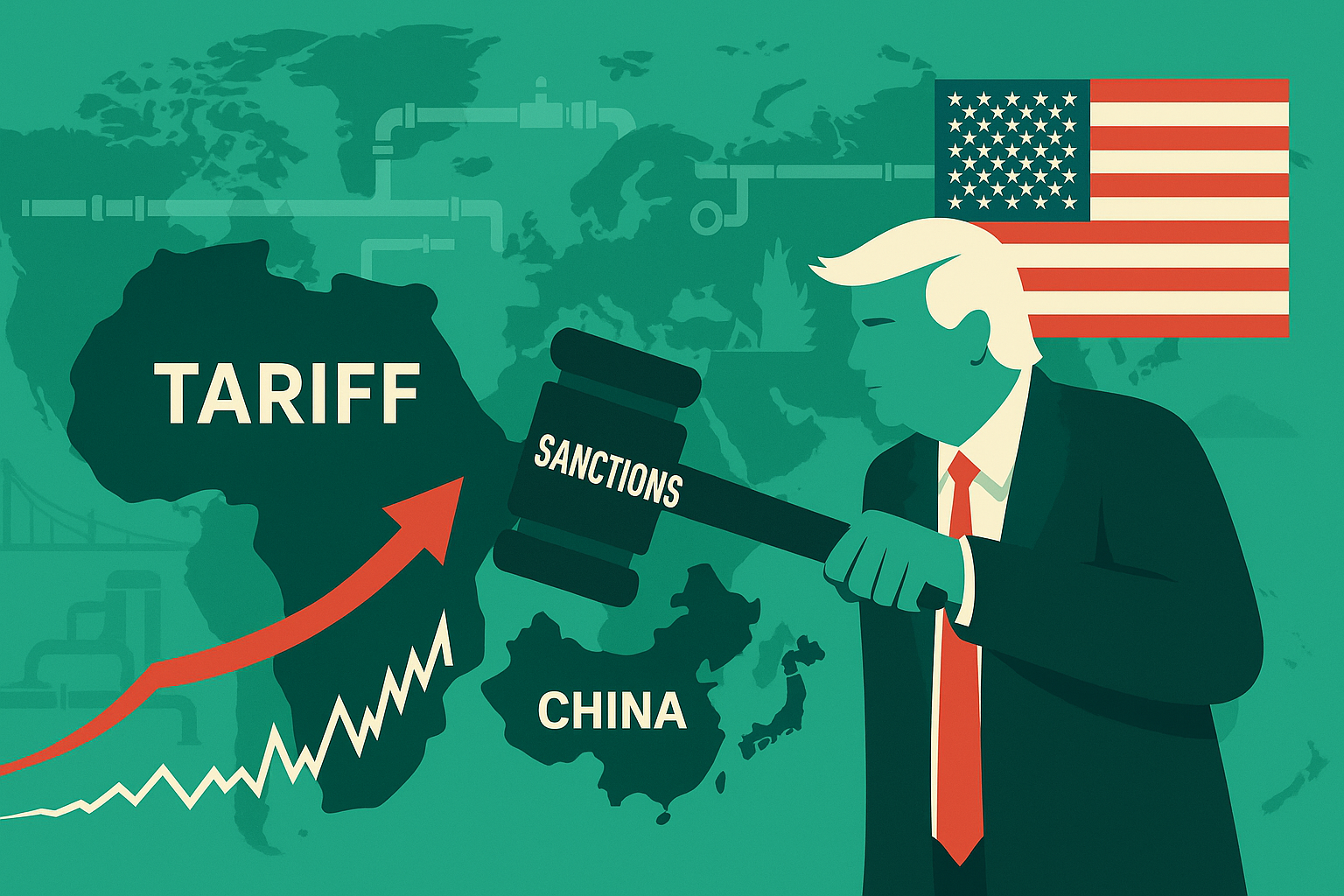August 2025 | By a Professional Economist
Executive Summary
In 2025, U.S. trade policy under the Trump administration has undergone a seismic shift, with across-the-board tariffs imposed on African nations—dismantling the preferential treatment long granted under the African Growth and Opportunity Act (AGOA). This transformation has triggered severe economic repercussions across the continent, particularly in South Africa, Lesotho, and Madagascar, where tariff hikes threaten exports, employment, and investor confidence.
This report examines:
- The U.S. legal and policy shift away from AGOA
- Country-specific economic impacts in Africa
- Emerging strategies by African governments
- The geopolitical implications for Africa-U.S. trade relations
1. A Structural Break from AGOA: The New Tariff Order
The Trump administration announced in July 2025 a base tariff of 15% on most countries, effectively nullifying AGOA benefits. Select nations such as South Africa, Algeria, and Libya now face tariff rates exceeding 30% on goods including textiles, automotive parts, and agricultural exports.
This signals a paradigm shift from preferential access to uniform protectionism in U.S. trade relations with Africa.
2. Country-Level Impact Analysis
🇿🇦 South Africa
- From August 8, 2025, a 30% tariff is scheduled on key exports such as citrus, wine, and vehicles.
- The Department of Trade and Industry estimates 30,000 jobs at risk.
- In response, President Ramaphosa has proposed a “Framework Deal” for negotiations and launched domestic industrial support desks to mitigate impact.
🇱🇸 Lesotho
- Initially subject to a 50% tariff, Lesotho successfully negotiated this down to 15%, yet the damage is palpable.
- The textile industry, which relies heavily on U.S. demand, reports factory closures and rising unemployment.
- The government warns of plummeting investor confidence in the export sector.
🇲🇬 Madagascar
- Once a major AGOA beneficiary, Madagascar now faces a 47% tariff on apparel exports.
- The expected loss of over 60,000 jobs in its garment industry has triggered emergency consultations with the U.S.
- The government is now seeking regional coordination and new market diversification strategies.
🇳🇬 Nigeria and Other West African Nations
- Nigeria was hit with an early 14% base tariff, prompting a policy pivot toward non-oil export diversification and stronger WTO lobbying.
- Conversely, nations such as Gabon and Senegal received tariff exemptions after high-level diplomacy at the June White House summit.
- Zimbabwe voluntarily removed tariffs on U.S. goods as a goodwill gesture to de-escalate trade tensions.
3. Africa’s Strategic Responses
Faced with abrupt tariff hikes and lost preferential access, African governments are adopting multi-pronged strategies:
| Country | Key Responses |
|---|---|
| South Africa | Framework deal with U.S., industrial support, domestic tax relief |
| Lesotho | Bilateral lobbying, investor reassurance campaigns |
| Madagascar | Regional alliances, diversification into EU/Asian markets |
| Nigeria | WTO engagement, export diversification schemes |
| Zimbabwe | Symbolic tariff reductions to signal cooperation |
| Senegal & Gabon | Diplomatic negotiation resulting in exemptions |
These reflect a shift from passive beneficiary status to active trade diplomacy and structural realignment.
4. Geoeconomic Implications: A Continent Repositioning Itself
| Dimension | Effect |
|---|---|
| Trade Dependence | Over-reliance on the U.S. exposed; diversification now urgent |
| Industrial Policy | Need for value-added export capacity and domestic job protection |
| Multilateral Engagement | Rising African coordination within WTO and AU frameworks |
| Competing Powers | China and the EU are leveraging the U.S. vacuum to deepen trade ties |
Africa is being forced to reposition its trade posture in a rapidly shifting global order. The era of unilateral U.S. preference is over; reciprocity and negotiation are the new norm.
Conclusion: A Strategic Wake-Up Call for African Trade Policy
The dismantling of AGOA and the imposition of sweeping U.S. tariffs mark a strategic rupture in Africa-U.S. trade relations. While short-term economic pain is unavoidable, the long-term response offers a unique opportunity for African nations to:
- Build resilient, diversified export bases
- Enhance regional value chains
- Strengthen multilateral trade engagement
Success will depend on each country’s ability to convert crisis into structural transformation. Africa’s future in global trade will no longer be shaped in Washington alone—but increasingly in Addis Ababa, Abuja, and Johannesburg.
For WordPress Use
- Title: U.S. Tariffs Shake Africa’s Trade Strategy: The End of AGOA and the Rise of Reciprocity
- Meta Description: As the U.S. imposes new tariffs on African exports, nations like South Africa and Madagascar scramble to protect industries and jobs. This report analyzes Africa’s evolving trade response.
- Tags: AGOA, U.S.-Africa trade, tariffs, South Africa, Lesotho, Trump administration, global trade
- Category: International Trade / Africa / Economic Policy
- Featured Image Prompt (already generated in earlier response):
- Flat-design, 4:3 illustration with emerald green tones. Depicts Trump with a “SANCTIONS” gavel targeting Africa, India, and China, showing economic arrows and impact zones.


